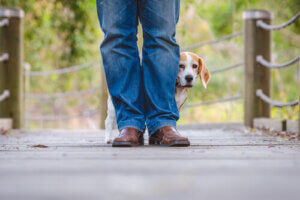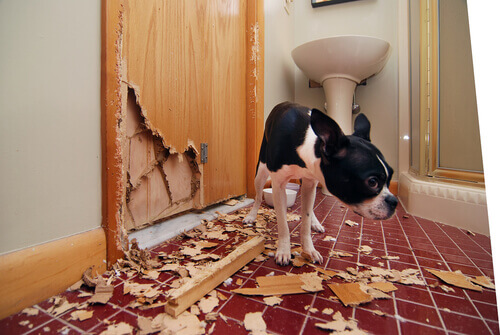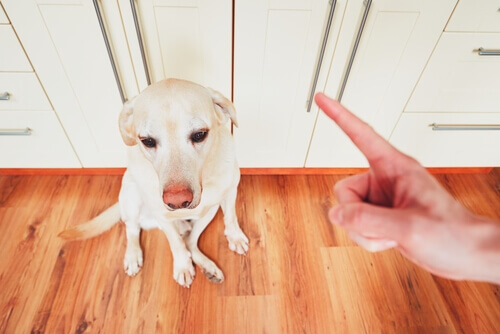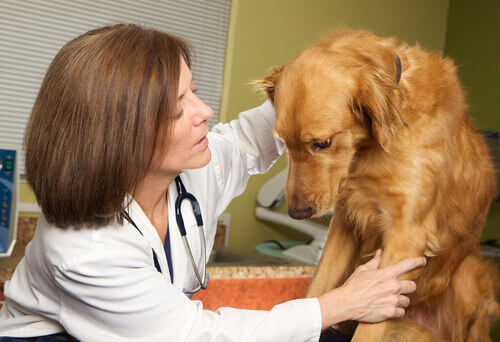How a Vet Can Help Correct Dog Behavior


Written and verified by the lawyer Francisco María García
Dog behavior can often become a problem during our daily coexistence with them and it can definitely cramp our style. You must understand that this animal evolved from wolves and, thus, may have some adaptive conflicts. This is precisely why dealing with unruly pets often requires the involvement of a professional.
These are social animals and are susceptible to behavioral disorders that can even become serious psychological problems.
One of the consequences of not dealing with bad behavior in a pet directly reflects the large number of animals that are either abandoned or sacrificed year after year.
Next, we’ll discuss the most frequent problems in dog behavior. Again, we’d like to insist on the importance of professional treatment by the veterinary, psychologist, or ethologist.
Problems with dog behavior
The most frequent problems in dog behavior in the context of family coexistence are in this order: aggressive behavior, inappropriate defecation, and destructive behavior.

In addition, there are disorders related to diet habits, sex, reproduction, movement, socialization, and mood. Let’s categorize these problems:
Socialization disorders
Aggressive behavior is the most typical disorder and can even endanger people’s lives. In contrast, hyper-submission means the dog is fearful and incapable of taking any initiative. Of course, their frustration comes out as excessive barking, which is highly annoying and problematic in the social environment.
Indiscriminate defecation
A dog may defecate in inappropriate places inside or outside the house. They also involuntarily urinate when they’re excited or to mark certain areas (males in particular).
Abnormal eating habits
A pet may eat compulsively and excessively and may also eat feces (coprophagia), unknown herbs, or inedible matter. All of this has an explanation and treatment.
Sexual and reproductive behavior disorders
A dog may eat their puppies for no good reason (they’re healthy and viable) or there may be a phantom pregnancy, or they may try to hump your guests. A professional can address any of these issues.
Movement issues
Running in circles, repetitive movements for no apparent reason, compulsive digging, escaping and wandering aimlessly are among these alterations in behavior. Keep in mind that you must correct them as soon as possible.
Mood disorders
These include all kinds of fear (e.g., of being left alone, of firecrackers), hypersensitivity, hyperactivity, and depression. They carry out destructive behavior, such as chewing or scratching objects (until they’re completely destroyed), anxiety, traumas, and phobias.
Certain dog behavior can be a problem
The causes for a dog’s bad conduct vary. They range from not having been properly socialized to traumas due to negative experiences.

Frequently, it’s owners who reinforced inappropriate behavior between the first 3 and 12 weeks of life. This is the time when they should have socialized the dog. They often go to two extremes: they were either amused by the behavior or they were punished harshly.
The thing is, those first weeks are the best time to train a pet. Thus, owners must teach them to respect limits so they grow to have a balanced character with the perfect balance of love, patience, and discipline.
Your dog has a behavioral disorder
The first thing you must do is consult the vet. This is because they’re not only trained to treat illnesses, but they can also help you build a quality relationship with your pet. They can do this by either treating the problem themselves or by referring you to a psychologist or an ethologist.

Another option at your fingertips is to consult a trainer. For instance, the solution might be as simple as teaching the animal to follow instructions. A specialist in this field has the capacity to promote positive behavior and eliminate or reduce negative ones by means of recognized techniques.
It’s time to consult a vet when the problem is crucial for the animal’s health or for the quality of their coexistence in your home. The first thing the professional will do is rule out any illness. You may not know it but this is the cause of many inappropriate behaviors.
Most veterinarians can prescribe pharmacological therapy in cases of physical or psychological illness. They’ll refer you to a colleague if necessary.
The role of the owner is important to proper dog behavior
The success of treatment aimed at restoring a dog’s good behavior will depend on the owner and their commitment to their animal’s welfare. Always use positive reinforcement instead of punishing. The love and patience you carry it out with will guarantee you positive results.
Dog behavior can often become a problem during our daily coexistence with them and it can definitely cramp our style. You must understand that this animal evolved from wolves and, thus, may have some adaptive conflicts. This is precisely why dealing with unruly pets often requires the involvement of a professional.
These are social animals and are susceptible to behavioral disorders that can even become serious psychological problems.
One of the consequences of not dealing with bad behavior in a pet directly reflects the large number of animals that are either abandoned or sacrificed year after year.
Next, we’ll discuss the most frequent problems in dog behavior. Again, we’d like to insist on the importance of professional treatment by the veterinary, psychologist, or ethologist.
Problems with dog behavior
The most frequent problems in dog behavior in the context of family coexistence are in this order: aggressive behavior, inappropriate defecation, and destructive behavior.

In addition, there are disorders related to diet habits, sex, reproduction, movement, socialization, and mood. Let’s categorize these problems:
Socialization disorders
Aggressive behavior is the most typical disorder and can even endanger people’s lives. In contrast, hyper-submission means the dog is fearful and incapable of taking any initiative. Of course, their frustration comes out as excessive barking, which is highly annoying and problematic in the social environment.
Indiscriminate defecation
A dog may defecate in inappropriate places inside or outside the house. They also involuntarily urinate when they’re excited or to mark certain areas (males in particular).
Abnormal eating habits
A pet may eat compulsively and excessively and may also eat feces (coprophagia), unknown herbs, or inedible matter. All of this has an explanation and treatment.
Sexual and reproductive behavior disorders
A dog may eat their puppies for no good reason (they’re healthy and viable) or there may be a phantom pregnancy, or they may try to hump your guests. A professional can address any of these issues.
Movement issues
Running in circles, repetitive movements for no apparent reason, compulsive digging, escaping and wandering aimlessly are among these alterations in behavior. Keep in mind that you must correct them as soon as possible.
Mood disorders
These include all kinds of fear (e.g., of being left alone, of firecrackers), hypersensitivity, hyperactivity, and depression. They carry out destructive behavior, such as chewing or scratching objects (until they’re completely destroyed), anxiety, traumas, and phobias.
Certain dog behavior can be a problem
The causes for a dog’s bad conduct vary. They range from not having been properly socialized to traumas due to negative experiences.

Frequently, it’s owners who reinforced inappropriate behavior between the first 3 and 12 weeks of life. This is the time when they should have socialized the dog. They often go to two extremes: they were either amused by the behavior or they were punished harshly.
The thing is, those first weeks are the best time to train a pet. Thus, owners must teach them to respect limits so they grow to have a balanced character with the perfect balance of love, patience, and discipline.
Your dog has a behavioral disorder
The first thing you must do is consult the vet. This is because they’re not only trained to treat illnesses, but they can also help you build a quality relationship with your pet. They can do this by either treating the problem themselves or by referring you to a psychologist or an ethologist.

Another option at your fingertips is to consult a trainer. For instance, the solution might be as simple as teaching the animal to follow instructions. A specialist in this field has the capacity to promote positive behavior and eliminate or reduce negative ones by means of recognized techniques.
It’s time to consult a vet when the problem is crucial for the animal’s health or for the quality of their coexistence in your home. The first thing the professional will do is rule out any illness. You may not know it but this is the cause of many inappropriate behaviors.
Most veterinarians can prescribe pharmacological therapy in cases of physical or psychological illness. They’ll refer you to a colleague if necessary.
The role of the owner is important to proper dog behavior
The success of treatment aimed at restoring a dog’s good behavior will depend on the owner and their commitment to their animal’s welfare. Always use positive reinforcement instead of punishing. The love and patience you carry it out with will guarantee you positive results.
This text is provided for informational purposes only and does not replace consultation with a professional. If in doubt, consult your specialist.








